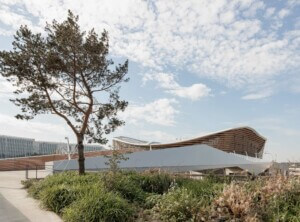Welcome back to the top of another Thursday, one rife with international news, shows to see, and new installations.
Here’s what you need to know today:
Spectators are banned from the 2021 Summer Olympics as COVID tears through Tokyo
COVID-19 is tearing through Tokyo and the city has declared a state of emergency amid more than two straight weeks of rising cases. What does that mean for the 2021 Summer Olympics, scheduled to start in two weeks on July 23? According to Olympic Minister Tamayo Marukawa, it means no in-person fans will be present at the games or any of its new venues, including at the opening ceremony in Kengo Kuma’s new $1.4 billion National Stadium. More than 10,000 Tokyo Olympics volunteers have quit in the run up to the games over coronavirus fears, and a majority of Tokyo residents polled have called for the event to either be postponed again or canceled.
H/t to AP News
The Netherlands rules Shell must cut emissions in climate law first
A civic court in the Netherlands has ruled that oil producer Shell must cut its emissions to 45 percent of 2019 levels, the first time a company has come under legal obligation to follow the Paris climate accords. Although the ruling will likely be appealed by Shell and only applies in the Netherlands if it stands, the case still sets a precedent for more climate change-related litigation going on all over the world.
H/t to the BBC
Families around Notre Dame Cathedral are suing Paris over lead contamination
The 2019 fire that gutted Paris’s Notre Dame Cathedral also aerosolized 450 tons of lead used in the building’s roof and spire, sending a cloud of toxic metal over surrounding neighborhoods and temporarily halting work to stabilize what was left of the building. Now, families who live around the cathedral are suing the city of Paris, alleging the city council intentionally left schools and daycare centers around Notre Dame open while failing to disclose the risk of lead exposure. According to the New York Times, French officials knew of the elevated lead levels in the air only days after the fire, but kept schools open and only warned the public five months later in June of 2019.
H/t to Artnet News
Glendale’s Armenian American Museum will break ground on July 11
Earlier this year AN reported that the Armenian American Museum in Glendale, California, would break ground sometime this summer, but the actual date, July 11, has finally been made official. Designed by Alajajian Marcoosi Architects, the rugged, striated massing of the two-story museum was intended to evoke the rock formations found across the Armenian Highlands. Once complete, the museum and education hub will celebrate the Armenian-American experience while honoring the 1.5 million lives lost in the Armenian Genocide.
H/t to Urbanize Los Angeles
Ellsworth Kelly’s postcards go on view at Skidmore College
The Frances Young Tang Teaching Museum and Art Gallery at Skidmore College in Saratoga, New York, is reopening on July 10, and will do so with a blockbuster survey of Ellsworth Kelly’s postcard collages. In Ellsworth Kelly: Postcards, which will run through November 28, the museum has collected approximately 150 of Kelly’s postcards, which the artist used both as an extension of his sketchbook to conceptualize new ideas, and sometimes as playful exercises in artistic contrast.
H/t to The Art Newspaper
As climate change fills and drains Lake Michigan, the threat to Chicago grows
Climate change-driven storms, flooding, and historic drops in Lake Michigan’s water level are putting Chicago in the crosshairs. For a city built on the Great Lakes, the health of the neighboring body of water is crucial to the city’s survival, and now beaches are being eroded away, homes flooded, and piers and water taxi stops destroyed (or left high and dry when Lake Michigan ebbs). Although sea levels are consistently rising, climate change has also been wreaking havoc on lakes—and the cities built next to them. The New York Times has put together an expansive primer of Chicago’s history of building with (and moving around) water, and how climate change is presenting America’s third-largest city with a set of unique challenges.
H/t to the New York Times











